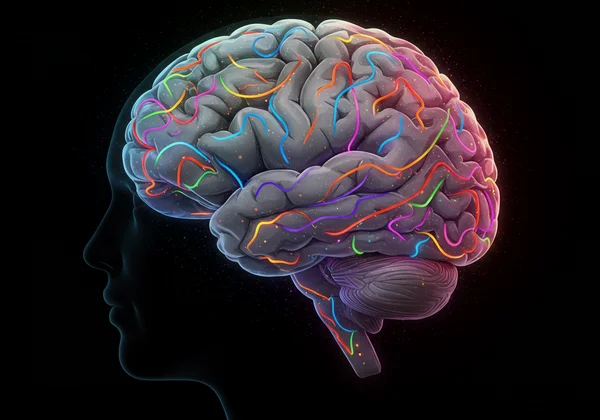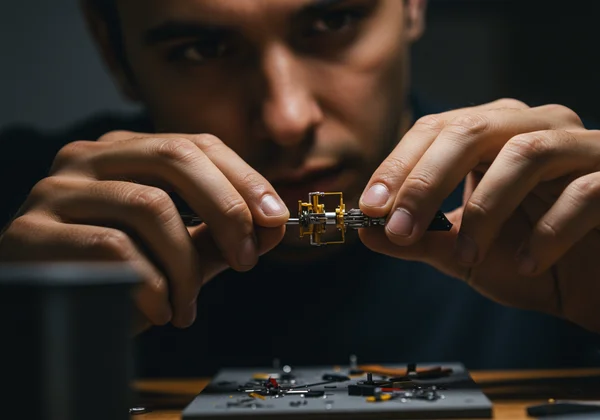Understanding Your Aspie Quiz Results: 5 Neurodivergent Strengths
August 26, 2025 | By Leo Sinclair
Your Aspie Quiz results are more than just numbers—they're a doorway to understanding your unique way of experiencing the world. If you've ever felt "different," this guide is for you. We'll explore 5 common neurodivergent traits, reframing them not as challenges, but as the powerful strengths they often are. What if these differences are actually your greatest strengths? This exploration is the first step toward a richer self-understanding, and you can begin your journey with a free aspie quiz.
What Are Neurodivergent Traits, Really?
Before we dive into the specifics, let's clarify what we mean by "neurodivergent traits." This term refers to the natural variations in the human brain regarding learning, attention, mood, and social interaction. For too long, these differences were viewed through a narrow lens of deficits. Today, we understand them as integral parts of a person's identity and a vital aspect of human diversity.
Shifting from Deficit to Difference
The concept of neurodiversity is a powerful paradigm shift. It moves away from seeing conditions like autism or ADHD as problems to be fixed. Instead, it recognizes them as natural variations of the human brain. This perspective helps us appreciate that different wiring can lead to incredible talents, unique perspectives, and innovative ways of thinking. Understanding your traits is not about finding what's "wrong," but discovering what makes you uniquely you.

How the Aspie Quiz Helps Identify These Traits
Tools like the Aspie Quiz are designed to be mirrors, reflecting potential traits associated with the autism spectrum. By answering questions about your experiences and preferences, you can see a pattern of your own cognitive and social style. The quiz provides a framework for self-reflection, helping you connect the dots between isolated feelings and recognized neurodivergent characteristics. It's a confidential and insightful first step in your self-assessment, available as an online asperger's test.
Trait 1: The Power of Special Interests
One of the most defining and rewarding neurodivergent traits is the capacity for deep, passionate engagement with specific subjects. Often called special interests, these are far more than mere hobbies; they are profound sources of joy, knowledge, and expertise.
From Hobby to Hyperfocus: A Source of Joy and Expertise
While a neurotypical person might enjoy a hobby, a neurodivergent individual can experience hyperfocus—an intense state of concentration on their special interest. This allows them to absorb vast amounts of information and develop a level of expertise that is truly remarkable. Whether it's coding, ancient history, train schedules, or mycology, this deep dive is intrinsically rewarding and a core part of their identity.

The Link Between Special Interests and Career Strengths
This intense focus is a superpower in the modern world. Many individuals on the autism spectrum excel in careers that leverage their special interests. Think of the meticulous programmer who can spot a single flawed line of code, the academic researcher who uncovers groundbreaking data, or the artist who creates intricate worlds. These passions often translate directly into valuable professional skills, turning a personal joy into a fulfilling career path.
Trait 2: A Unique Sensory Sensitivity Profile
Many neurodivergent individuals experience the world with a heightened or altered sensory sensitivity. This means their brains process sights, sounds, smells, tastes, and textures differently than their neurotypical peers. This can be challenging, but it also comes with its own set of strengths.
Understanding Hypersensitivity and Hyposensitivity
Sensory processing differences can manifest in two key ways. Hypersensitivity is an over-responsiveness to stimuli—fluorescent lights may feel blindingly bright, a distant conversation can be distracting, or the tag on a shirt can feel unbearable. Conversely, hyposensitivity is an under-responsiveness, where someone might seek out strong sensations, like loud music, spicy foods, or deep pressure, to feel regulated. Many people experience a mix of both across different senses.
The Strength in Noticing What Others Miss
A heightened sensory profile often means an incredible eye for detail. An autistic individual might be the first to notice a subtle change in a design, an off-key note in a piece of music, or an inconsistency in a data set. This ability to perceive nuances that others overlook is a significant advantage in fields requiring precision, quality control, and keen observation. This detailed perception can be explored through a neurodivergent self test.
Trait 3: Advanced Pattern Recognition & Logic
Many people with Asperger's traits have a remarkable gift for logic and pattern recognition. This brain is often wired to analyze systems, identify rules, and understand how things work from the inside out.
Why You Might Be a Natural at Systemizing
Systemizing is the drive to analyze and build systems. People with a strong systemizing brain are drawn to rule-based subjects like mathematics, computer science, mechanics, and grammar. They thrive on understanding the underlying structure of a system, whether it's a machine, a piece of software, or a social hierarchy. This logical framework provides a sense of predictability and order in a world that can often feel chaotic.

Seeing the Logic in a Seemingly Chaotic World
This skill allows neurodivergent individuals to find clarity where others see confusion. They can often cut through emotional or irrelevant details to get to the core of a problem, offering logical and innovative solutions. Their ability to see the world as a series of interconnected systems makes them exceptional problem-solvers, strategists, and analysts. If this resonates with you, you can explore your traits further.
Trait 4: Direct Communication and Honesty
Neurodivergent individuals often communicate with a refreshing directness and honesty, preferring clarity over social subtlety. While this can sometimes be misunderstood in a neurotypical world that relies heavily on unspoken rules, it is a significant strength.
The Value of a Straightforward Approach
A preference for direct communication means a commitment to truth and accuracy. An autistic person is more likely to say what they mean and mean what they say, avoiding ambiguity and social games. This honesty builds deep trust with friends and colleagues who value sincerity. In any environment, having someone who communicates clearly and without pretense is an invaluable asset.
Navigating Social Nuances as a Direct Communicator
While navigating social expectations can be a learning process, the core value of honesty remains a strength. It fosters authentic relationships and creates environments where everyone knows where they stand. With mutual understanding, this straightforward approach can lead to more efficient collaboration and deeper, more genuine connections, reducing confusion and anxiety for everyone involved.
Trait 5: A Different Rhythm for Social Connection
The concept of friendship and social connection can look different for neurodivergent people. The goal is often not a wide circle of acquaintances but a few deep, meaningful bonds built on shared interests and mutual respect.
Quality Over Quantity in Friendships
Managing social energy is crucial. Small talk and large gatherings can be incredibly draining, while a one-on-one conversation about a special interest can be energizing. Because of this, many autistic individuals prioritize a few close friendships where they can be their authentic selves. These relationships are often characterized by intense loyalty and profound understanding.
Finding Your Community and Thriving
Thriving socially means finding your people. This might be in online forums dedicated to a special interest, a local club, or a workplace with other like-minded individuals. In these spaces, differences are not just accepted but celebrated. Finding a community where you don't have to mask your true self is liberating and essential for well-being. This is a key part of the journey after taking an autism spectrum quiz for adults.
Embrace Your Neurotype: Your Journey Starts Today
Understanding these five traits—passionate special interests, a unique sensory profile, advanced logic, direct communication, and a deep approach to social connection—is about recognizing them as integral parts of your neurotype. These are not flaws to be corrected but strengths to be harnessed. They offer a unique and valuable way of engaging with the world.
Ready to explore your own profile more deeply? Revisit your results with these insights in mind, or take the Aspie Quiz today to begin your journey of self-discovery. Embracing who you are is the most powerful step you can take.
Your Questions About Aspie Quiz Traits Answered
What do my Aspie quiz scores mean?
Your scores on the Aspie quiz provide a snapshot of where you fall on a spectrum of neurodivergent (Aspie) and neurotypical traits. A higher Aspie score suggests you share many traits common among autistic individuals, while a higher neurotypical score suggests your traits align more with the general population. Think of it not as a grade, but as a map to help you understand your own mind. The results from the official aspie quiz can offer detailed insights.
Is the Aspie quiz a formal diagnosis?
No, it is critically important to understand that the Aspie Quiz is not a medical diagnosis. It is a preliminary self-screening tool designed for self-exploration and to provide insights. If your results cause you concern or you wish to seek a formal assessment, you should consult with a qualified healthcare professional, such as a psychologist or psychiatrist. The quiz can be a great starting point for that conversation.
Can you develop Asperger's traits later in life?
Autism spectrum traits are considered to be present from birth, as they relate to brain development. However, it is very common for individuals, especially women and those with lower support needs, to not recognize or understand these traits until adulthood. A life change, period of stress, or simply learning about neurodiversity can lead to a moment of self-discovery where lifelong patterns suddenly make sense. You don't develop traits later, but you can certainly discover them.